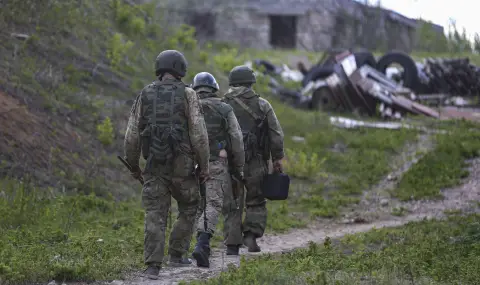When the Russian army occupied part of Zaporizhzhia region in Ukraine in March 2022, Andrey (name changed for security reasons) was the director of a rural school. After the occupation authorities demanded that the new school year begin with a Russian curriculum, the man refused to stay in his post.
The occupation authorities tried to force him to cooperate with them – armed men repeatedly came to his home to threaten and pressure him. They took his phone and computer, then took him to the steppe and left him there overnight – 10 km from the village.
"They make you walk through a minefield"
In the summer of 2023, the Russians took away the Ukrainian passports of Andrey and his wife. "This was accompanied by threats that they would take me to the nearby occupied town of Vasilevka and make me walk through a minefield", the man says. Until 2022, there was a checkpoint in this town through which one could reach Ukrainian-controlled territory. In the meantime, the Russian authorities have closed it, but continue to use it to deport Ukrainians, forcing them to walk through minefields to Ukrainian positions.
Such cases have been described by a number of human rights organizations, including the UN Human Rights Monitoring Mission. Her report, for example, tells the story of a couple who were first arrested and then deported for distributing pro-Ukrainian leaflets. The same report also contains information about a worker at the Zaporozhye nuclear power plant. A video shows Russian military police taking him to the checkpoint in Vasilevka and apparently expelling him from the occupied territory. He has not been seen since. As human rights activists note: "Under international humanitarian law, the deportation of persons from the occupied territories is prohibited, regardless of the motives."
They are being forced to take Russian passports
The director of the rural school, Andrey, was not deported, but his family faced another problem - a forced passport change. In April 2023, Russian President Putin signed a decree according to which residents of the occupied Zaporizhzhia, Kherson, Donetsk and Luhansk regions had to obtain a Russian passport by July 1, 2024, in order not to be registered as “foreigners“. In this case, they would be deported.
“The pressure to obtain a Russian passport began at the beginning of 2023. The biggest blow was the ban on hospitals accepting people with Ukrainian passports, imposed by the head of the occupation administration in Zaporizhzhia region. In addition, pensioners who received Russian passports were paid higher pensions, and the salaries of people with Ukrainian passports were 30 percent lower than those with Russian passports. That is why the population began to obtain foreign passports“, explains Andrey. He and his wife held out until December 2023, but it became increasingly difficult – even to leave the village, documents were required. In the end, the couple applied for Russian passports, but were refused without explanation.
The occupation authorities finally decided to deport the family. In April, armed men came to their home again, presented the couple with some kind of document and said: “You have one hour to pack your bags“. As Andrey says: “I started reading the document, which said that I had committed an administrative offense – entering the territory of the Russian Federation as a stateless person“.
First they were taken to Berdyansk, where they put black bags over their heads and kept them for six days in a building where other people were also accommodated. Then they were taken to Melitopol, where they were interrogated by FSB officers. The occupation authorities asked Andrey to cooperate with them – he refused.
Deportation to Georgia and Latvia
From there, the family and two other men were loaded into a car, and the next day the deportees found themselves at the border between Russia and Georgia. There, their passports and phones were returned and they were ordered to go to Georgia. The couple went to Tbilisi, where volunteers put them up in a hotel. A week later, after preparing their documents for traveling abroad, they returned to Ukraine and are now trying to settle in a new place. “The expenses, of course, are very high. But it's still summer and it's easier“, says Andrey. Leaving their home, the couple managed to take almost no clothes with them.
And these are not the only ones who have been deported by the Russian occupation authorities to Georgia - it is also known about two priests from the Orthodox Church of Ukraine who were deported from Donbas. They refused to cooperate with the Russians, for which they were arrested in the fall of 2023 and accused of pro-Ukrainian activities. The Georgian authorities have not yet given DW an answer as to whether Ukrainians from the occupied territories have been deported to their country, as well as whether there is an agreement between Georgia and Russia on this matter. It is also known about the deportation of Ukrainians to Latvia. However, the Prosecutor General's Office points out that "the real number of forcibly displaced Ukrainian citizens will be able to be established only after the end of hostilities."
Meanwhile, Russia has extended the permitted period of residence of Ukrainians without a Russian passport in the occupied territories until December 31, 2024. The next wave of deportations could begin as early as the beginning of next year.
Author: Hanna Sokolova
